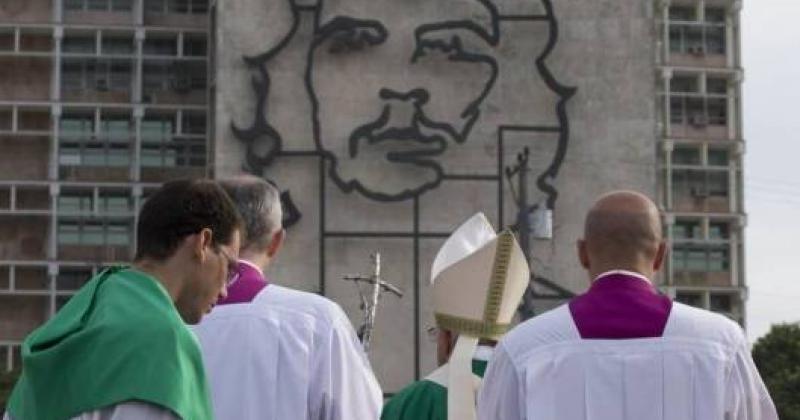Francis celebrates mass in Havana’s Plaza della Revolución, inviting Cubans not to neglect their brothers and sisters “for plans which can be seductive, but are unconcerned about the face of the person “beside you. At the Angelus, the Pope appealed for a peaceful solution to the military conflict between FARC forces and the Colombian government
“Service is never ideological, for we do not serve ideas, we serve people.” Today Francis celebrated his first mass on Cuban soil, in a square that became the symbol of the revolution, the stage for Fidel Castro’s political speeches. To get a ticket to attend the mass, Cubans had to register their name and surname with the authorities. This time, the platform where Francis spoke from was not placed in front of the giant portrait of Che Guevarra – which is kept lit until dawn – but to the side of it. Today, the image of Jesus of the Divine Mercy stands out on a wall across the square, facing the altar.
The Pope’s homily was inspired by Matthew’s Gospel which describes the argument between Jesus’ disciples as to who was most important: “The disciples were arguing about who would have the highest place, who would be chosen for privileges, who would be above the common law, the general norm, in order to stand out in the quest for superiority over others. Who would climb the ladder most quickly to take the jobs which carry certain benefits.” The answer Jesus gave to them is simple: “Whoever wishes to be the first among you must be the last of all, and the servant of all”. So “whoever wishes to be great must serve others,” Francis pointed out, “not be served by others”. Indeed, Jesus explains that “life is lived authentically in a concrete commitment to our neighbour”.
“Far from any kind of elitism,” the Pope added, “the horizon to which Jesus points us is not for those few privileged souls capable of attaining the heights of knowledge or different levels of spirituality. The horizon to which Jesus points us always has to do with daily life, also here on “our island”.” Francis draws one simple and concrete piece of advice from this Gospel passage: always “look at the face” of your “brothers and sisters”, “touch their flesh”, “sense their closeness and even, in some cases, “suffer” in trying to help”. Hence, “service is never ideological, for we do not serve ideas, we serve people”. Attention to the poor cannot be limited to slogans, ideologies or mere rhetoric.
The Pope cautioned against the temptation of “service” that is “self-serving”. “There is a way to go about serving which is interested in only helping “my people”, “our people”.” “This service always leaves “your people” outside, and gives rise to a process of exclusion,” Francis said.
Alluding to consumerism, Francis urged Cubans not to give into “seductive” plans. “God’s holy and faithful people in Cuba,” he said, “is a people with a taste for parties, for friendship, for beautiful things. It is a people which marches with songs of praise. It is a people which has its wounds, like every other people, yet knows how to stand up with open arms, to keep walking in hope, because it has a vocation of grandeur. Today I ask you to care for this vocation of yours, to care for these gifts which God has given you, but above all I invite you to care for and be at the service of the frailty of your brothers and sisters. Do not neglect them for plans which can be seductive, but are unconcerned about the face of the person beside you.”
At the end of the mass, the Archbishop of Havana, Cardinal Jaime Ortega y Alamino, greeted the Pope and mentioned the process of reconciliation between Cuba and the US, expressing the hope that this will not remain “at the level of high politics” but that it will “reach the people of both nations and especially our people, the people of Cuba, who are living here and in the United States”. He called for reconciliation “among Cubans living both in and outside Cuba”.
At the Angelus, Francis appealed for a peaceful solution in the historic military conflict between FARC forces - Colombia’s Marxist guerrillas - and the Colombian government. Negotiations are taking place in Havana and the possibility of a meeting between the Pope and FARC representatives was put forward.
“May the blood shed by thousands of innocent people during long decades of armed conflict, united to that of the Lord Jesus Christ crucified,” the Pope said during the Angelus, “sustain all the efforts being made, including those on this beautiful island, to achieve definitive reconciliation. Thus may the long night of pain and violence can, with the support of all Colombians, become an unending day of concord, justice, fraternity and love, in respect for institutions and for national and international law, so that there may be lasting peace. Please, we do not have the right to allow ourselves yet another failure on this path of peace and reconciliation.”
Before the start of the mass, as Francis was making his way through the square in the Popemobile, three dissidents – two men and a woman – tried to hand out some leaflets. They were quickly stopped by security and escorted away from the square.
As he moved through the square in the Popemobile, Francis spotted an Argentinian priest he knew in the crowd and invited him to join him at the altar and concelebrate mass with him.
